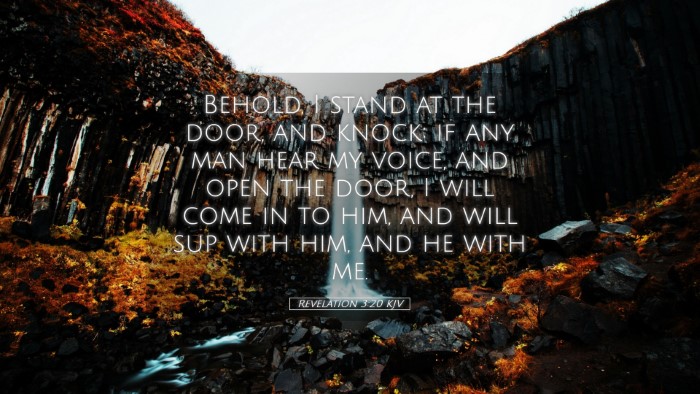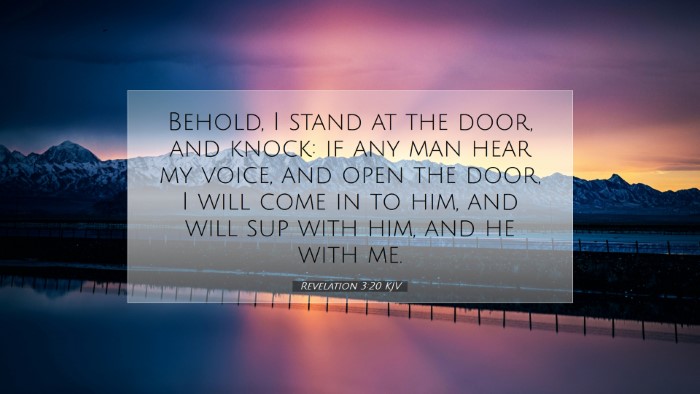Commentary on Revelation 3:20
Revelation 3:20 states:
"Behold, I stand at the door, and knock: if any man hear my voice, and open the door, I will come in to him, and will sup with him, and he with me."
Contextual Overview
This verse is part of the letter addressed to the church in Laodicea, which is one of the seven churches mentioned in the Book of Revelation. The Laodicean church is characterized by its lukewarm faith—neither hot nor cold—which results in the Lord's admonition to them. Understanding this context is crucial for interpreting the significance of Christ's invitation in this verse.
Exegesis of the Text
-
Invitation to Relationship:
This verse emphasizes the relational aspect of Jesus' call. As Matthew Henry notes, the Lord does not force entry but graciously knocks, indicating the need for human response to divine initiative. This portrays the essence of Christian faith—an active engagement and acceptance of Christ into one’s life.
-
The Image of Standing and Knocking:
Albert Barnes highlights the imagery used in this verse, implying both patience and longing. Christ stands at the door of the heart, knocking. This metaphorical door represents the entrance to one’s soul, showcasing that Jesus desires fellowship with individuals, inviting them to communion and intimacy.
-
Hearing His Voice:
Adam Clarke emphasizes the necessity of being attuned to Christ’s voice. The call to "hear" indicates the importance of spiritual discernment and responsiveness. There is an active component here—the believer must not only hear but respond appropriately by opening the door of their heart.
Theological Insights
The theological implications of this passage are profound, particularly concerning the nature of salvation and fellowship. It challenges believers on several fronts:
-
God's Sovereignty and Human Response:
The tension between divine sovereignty and human agency is palpable. Although Christ initiates the encounter, the responsibility rests upon the individual to respond. This cooperation between divine initiative and human will is critical in understanding soteriology.
-
Communion with Christ:
Jesus' promise to "sup with him" indicates communion, which highlights not just a casual fellowship but a deeply intimate relationship. This aligns with the practices of early Christians who shared meals to symbolize unity and mutual support in the faith community.
-
Lukewarmness and Repentance:
Given the context of the Laodicean church, the call to repentance is central. The assurance of Christ’s presence is extended to those who may feel they have drifted away due to spiritual apathy. There is hope for restoration if one chooses to open their heart to Christ anew.
Practical Applications
This verse invites reflection and application in the lives of believers:
-
Self-Examination:
Pastors and students of the Word are encouraged to engage in self-examination. One must consider their spiritual temperature: Are they actively welcoming Christ in their daily lives or allowing Him to stand idle at the door?
-
The Call to Evangelism:
This Scripture also compels believers to share the message of Christ’s knocking with others. There are many hearts waiting for an invitation, and Christians are tasked with echoing Christ's call to the world.
-
Emphasis on Community:
The communal aspect of "supper" reflects the role of the church as a place where believers are called to invite Jesus into their collective experience. It illustrates the need for unity and shared experiences centered around Christ.
Conclusion
Revelation 3:20 stands as a poignant reminder of Christ's desire for an intimate relationship with humanity. Through historical context, theological insights, and practical applications, this verse encourages believers to recognize and respond to the Savior’s persistent invitation. Christ desires to enter and establish a transformative communion, and each individual holds the key to their heart’s door.


